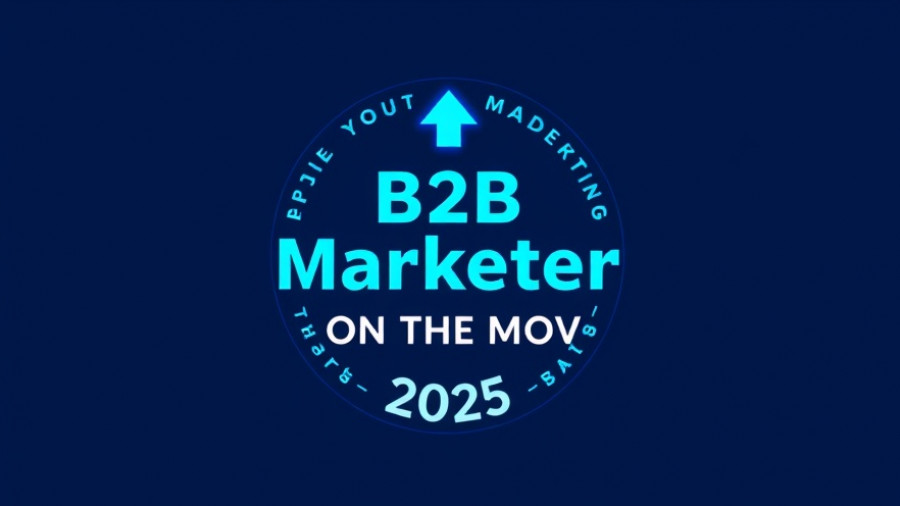
Transforming the B2B Landscape: Notable Marketing Leaders to Watch
As we move into Fall 2025, the B2B marketing industry is witnessing significant transformations, driven by new leadership, technological advancements, and a shift in buyer expectations. The latest installment of 'B2B Marketers on the Move' showcases 50 exemplary professionals who have either stepped into new roles or moved up the ranks in their firms. Recognizing these individuals not only celebrates their achievements but also highlights evolving strategies crucial for thriving in today’s marketplace.
This year has been tumultuous for marketers, marked by challenges posed by economic fluctuations and technology advancements. A report from Taligence indicates an ongoing skills gap that has caught many companies off guard, particularly concerning the burgeoning demand for expertise in AI and digital strategies. Job roles requiring a blend of creative and analytical skills are in flux, with companies increasingly seeking specialized talent rather than filling positions strictly based on experience.
Key Players Driving Change
Among those highlighted, Suruchi Sharma, recently appointed VP of Marketing at Zscaler, represents the trend of blending technical skills with marketing prowess. An ex-Googler with a strong foundation in demand generation and digital transformation, Sharma is emblematic of the evolving requirements for today’s marketers. Similarly, Stephanie Losee, now Director and Executive Editor at Salesforce, brings lessons learned from her content strategies at top firms like Dell and Visa to the table, where storytelling becomes a pivotal part of effective marketing.
Moreover, Josh Mueller, who has transitioned to Chief Marketing Officer at Candescent, embodies how traditional skills are being combined with cutting-edge digital strategies to foster enhanced customer engagement. Marketers like Mueller are vital for modern organizations aiming to modernize their approaches and cater effectively to a changing audience.
Adjusting to Market Demands
As the focus on AI in marketing intensifies, B2B leaders must prioritize understanding its implications fully. Companies are beginning to recognize that AI is no longer just an optional enhancement but a central component of successful strategies. Marketers are adapting, with 83% of B2B decision-makers anticipating increased investment in marketing within the next year, signaling optimism for an industry transformation.
Jon Miller, in his 2025 predictions for B2B marketing, underscores the necessity for industries to move away from the conventional lead generation metrics towards building meaningful customer relationships instead of focusing solely on MQLs (Marketing Qualified Leads). As brands encounter greater scrutiny from their audiences, authenticity in messaging, coupled with innovative AI-driven insights into customer behavior, will help marketers become more effective.
The Importance of Adaptability
The overarching theme this year is adaptability. Marketing organizations that succeed will be those that not only embrace change but also innovate their practices to resonate with informed customers. This adaptability often emerges from a well-rounded understanding of the market, which begins with recognizing the value of skills such as data literacy and storytelling.
The Path Ahead for B2B Marketers
As we look forward into 2026, organizations must also consider the evolving role that marketing plays within their structures. Collaborative environments that allow marketing teams to share insights across departments will help ensure the alignment of goals and strategies. Continuous investments in training, particularly around AI and data analytics, will enable marketers to stay ahead of trends, fulfill customer needs effectively, and enhance engagement.
Final Thoughts & Call to Action
For small and medium-sized businesses, keeping up with these changes may feel daunting. However, by recognizing the shifting landscape and understanding what successful marketers are doing, companies can better position themselves in the competitive B2B space. The rise of innovative thinkers and specialized roles signals that the future of marketing will require not only creativity and critical thinking but also technological expertise.
Therefore, take this opportunity to evaluate your marketing strategies and align them with these emerging trends. Embrace adaptation, invest in learning, and lead your organization into the new wave of B2B marketing effectiveness.
 Add Row
Add Row  Add
Add 



Write A Comment